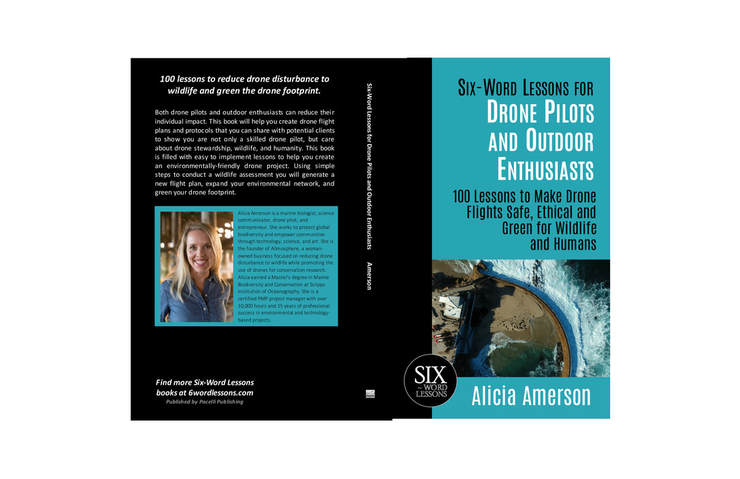As with many fabulous pieces of advice, it’s not rocket science. BUT it takes considerable skill to bring these little pearls of wisdom from the periphery of our consciousness to front and center in our mind. And that’s something that Alicia Amerson has done particularly well in her latest book ‘Six-word lessons for Drone Pilots and Outdoor Enthusiasts: 100 Lessons to Make Drone Flights Safe, Ethical, and Green for Wildlife and Humans’.
This book is part of the ‘Six-Word Lessons’ series of books. I confess to not knowing anything about this style prior to reading her book, but it certainly makes for easy reading – even in a single sitting. The book is divided into chapters that are all named with six words. Each of her 100 lessons is also entitled with six words, followed by a short paragraph description.
The crux of the book is that we all have a shared responsibility to care for our environment and those that live in it. She explores this through understanding the positive and negative impacts that drones and their operations can have, with a particular flavor of wildlife protection. Alicia’s research and experience as a marine biologist and drone pilot make her an authoritative source on the potential impacts our behavior causes, and ways in which to mitigate those impacts.
One thing that has stood out in my mind is that while you may not perceive an animal’s behavior to change, that doesn’t mean that a drone hasn’t distressed it. The example she gives is of a bear whose heart rate increased 400% in response to a nearby drone, despite showing no other visible signs of stress. She also points out that it is not only the drone noise, but the shadow and silhouette that need to be considered.
Now I work a lot on coral reefs and I have heard others say ‘don’t worry about the drone, boats are far more disruptive’. And they may well be, but I also don’t believe that we should say ‘don’t worry about cigarettes, ice is way worse’. I think that we should worry about both. And that’s not to say that drones shouldn’t be flown, but just that we should take care to do so respectfully. The power is in our hands to reduce our impacts.
Alicia’s book is filled with common sense reminders, and little gems about animal behavior. I love her ideas for ‘greening your drone footprint’, and I’m super impressed by the wealth of knowledge she has managed to distil into such a simple format. I highly recommend this as required reading for anyone flying drones in our great outdoors.
This book is part of the ‘Six-Word Lessons’ series of books. I confess to not knowing anything about this style prior to reading her book, but it certainly makes for easy reading – even in a single sitting. The book is divided into chapters that are all named with six words. Each of her 100 lessons is also entitled with six words, followed by a short paragraph description.
The crux of the book is that we all have a shared responsibility to care for our environment and those that live in it. She explores this through understanding the positive and negative impacts that drones and their operations can have, with a particular flavor of wildlife protection. Alicia’s research and experience as a marine biologist and drone pilot make her an authoritative source on the potential impacts our behavior causes, and ways in which to mitigate those impacts.
One thing that has stood out in my mind is that while you may not perceive an animal’s behavior to change, that doesn’t mean that a drone hasn’t distressed it. The example she gives is of a bear whose heart rate increased 400% in response to a nearby drone, despite showing no other visible signs of stress. She also points out that it is not only the drone noise, but the shadow and silhouette that need to be considered.
Now I work a lot on coral reefs and I have heard others say ‘don’t worry about the drone, boats are far more disruptive’. And they may well be, but I also don’t believe that we should say ‘don’t worry about cigarettes, ice is way worse’. I think that we should worry about both. And that’s not to say that drones shouldn’t be flown, but just that we should take care to do so respectfully. The power is in our hands to reduce our impacts.
Alicia’s book is filled with common sense reminders, and little gems about animal behavior. I love her ideas for ‘greening your drone footprint’, and I’m super impressed by the wealth of knowledge she has managed to distil into such a simple format. I highly recommend this as required reading for anyone flying drones in our great outdoors.

 RSS Feed
RSS Feed
